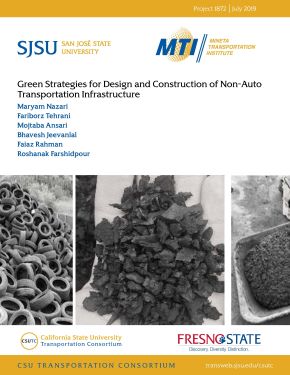- 408-924-7560
- mineta-institute@sjsu.edu
- Donate
Green Strategies for Design and Construction of Non-Auto Transportation Infrastructure
Application of Tire-Derived Aggregates (TDA) as a green, durable, and economically-efficient material, enhances the sustainability of transportation infrastructure. Throughout the course of this research study, the application of TDA in combination with expanded clay (EC) aggregates will be investigated in concrete slabs used in road pavements and bridge decks serving non-auto traffic, such as bicycle routes, through a set of experimental tests and life-cycle cost analyses. To this end, TDA, which is obtained from recycled tires, and EC, produced in rotary kilns, substitute for coarse aggregates in conventional concrete. The final product, also known as lightweight rubberized concrete, is durable and economically-efficient. It also enhances the sustainability of transportation infrastructure by mitigating the necessary maintenance and rehabilitation needs of these slabs. In this report, an experimental study has been undertaken to first estimate mechanical properties of lightweight rubberized concrete using 100% EC, 100% TDA, and a mixture of 20% EC – 80% TDA; the TDA was replaced by the volume of the EC aggregates. Next, a series of static flexural and dynamic impact-fatigue tests were performed on simply-supported beam specimens and slab assemblies, respectively, to measure both modulus of rupture and durability when subjected to the applied loads. The cyclic testing results confirmed a lower flexural strength of the rubberized concrete specimens. However, the specimens exhibited an ability to withstand larger plastic deformations up until the point of failure. Using the results of impact-fatigue tests, a life-cycle cost analysis was also performed, which confirmed long-term benefits of constructing green and durable infrastructure, using TDA and EC, on transportation investments. In conclusion, using these durable materials in infrastructural construction will lessen their maintenance and rehabilitation needs. Further, this application will divert waste tires from landfills.
MARYAM NAZARI
Dr. Maryam Nazari is an Assistant Professor of Structural Engineering in the Department of Civil and Geomatics Engineering at CSU, Fresno. Her research interest is the application of seismic-resilient precast concrete solutions for design of structures. During her graduate studies, she worked on a research study funded by the National Science Foundation (NSF). She accomplished large-scale shake table experiments on self-centering precast concrete wall systems at the Network for Earthquake Engineering Simulation (NEES) facility of the University of Nevada at Reno (UNR), with the purpose of investigating the impact of different energy dissipating components of these innovative structural systems on their seismic responses. She also participated in several rehabilitation and strengthening projects during her five-year professional experience as a structural design engineer, seismic specialist, and project manager. She has about 10 peer-reviewed conference proceedings and journal papers and has done more than 10 presentations in national and international conferences as well as technical meetings. Her recent research awards include the ASCE Fresno Best Research Project (in collaborations with Dr. Tehrani), SEI/ASCE Young Professional Scholarship, and the Iowa State University’s Research Excellence award.
FARIBORZ TEHRANI
Dr. Fariborz Tehrani is an Associate Professor of Civil Engineering at California State University, Fresno, with research and practice background in Sustainable and Resilient Structural Engineering, Mechanics, and Materials (SR-SEMM). He has practiced transportation engineering in the California Department of Transportation and has performed multiple research projects in the areas of lightweight aggregates and concrete materials, and has received external funding for research projects from the California Department of Transportation, National Science Foundation, and other professional entities. His extensive background and credentials in engineering design (PE), management (PMP), and sustainable practices (ENV SP) have enabled him to integrate research with education and practice, which has been the key in his teaching success. Over the past seven years, he has established a diverse research and practice group to attract underrepresented students and has mentored numerous students on their thesis and projects. He is the recipient of multiple awards, including ASCE CA Outstanding Faculty, CHESC Best Practice, and ASCE Fresno Best Research Project.
MOJTABA ANSARI
Mojtaba Ansari is a visiting scholar and PhD student at Fresno State. He received his bachelor’s and master’s degrees, respectively, from Shiraz University and Sharif University of Technology, Iran, in Civil/Earthquake Engineering and is currently a PhD student at Tarbiat Modares University, Iran. His main research interests include seismic soil-structure interaction, seismic hazard analysis, numerical and physical modeling of soil-structure systems, and seismic risk assessment of structures. His doctoral research works towards shake table testing of structures sitting on pile foundations to assess the seismic vulnerability of the superstructure.
BHAVESH JEEVANLAL
Bhavesh Jeevanlal received his master’s degree in Civil Engineering at Fresno State. He has co-authored a conference paper, and was also a Dean’s Medalist Nominee during his master’s program. He is actively working with a precast firm in California as a project engineer. He is also an active member of ASCE and ACI.
FAIAZ RAHMAN
Faiaz Rahman is an undergraduate student studying electrical engineering and computer science. As a former civil engineering student at the time of this study, Faiaz explored the sustainable development of infrastructure and its applications in urban systems. A native of Bangladesh interested in the intersection of education and technology along with intelligent urban systems, Faiaz hopes to expand the accessibility of educational resources to underserved and underdeveloped parts of the world, where advancements in sustainable infrastructure will further aid in their development.
ROSHANAK FARSHIDPOUR
Roshanak Farshidpour is currently an undergraduate student pursuing a Civil Engineering degree at CSU Fresno. She will be obtaining a bachelor’s degree with an emphasis in Structural Engineering in the Spring of 2019. Roshanak hopes to pursue a master’s in Structural and Earthquake Engineering in Fall 2019 at UCLA. Ultimately, she aims to work towards creating projects that will direct the field of Civil Engineering towards innovative, sustainable, and economic approaches.
-
Contact Us
San José State University One Washington Square, San Jose, CA 95192 Phone: 408-924-7560 Email: mineta-institute@sjsu.edu






